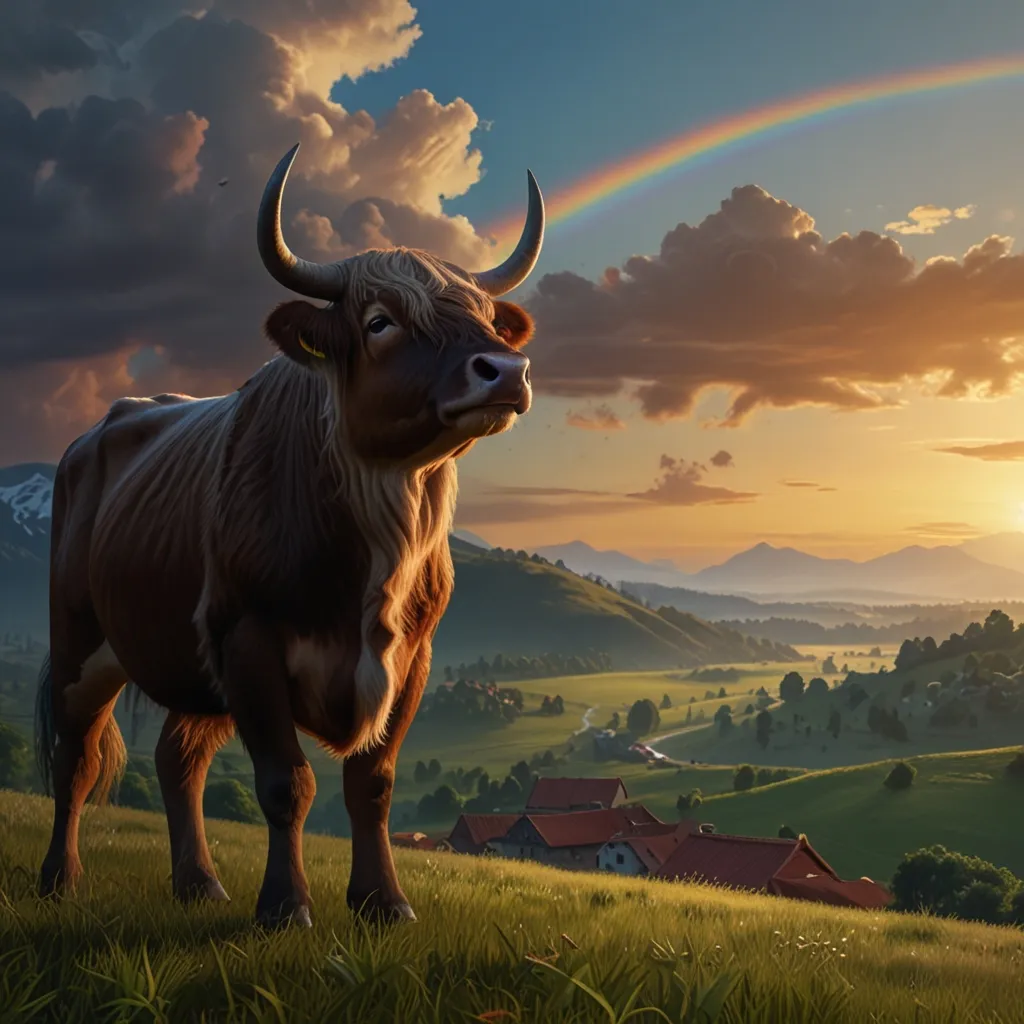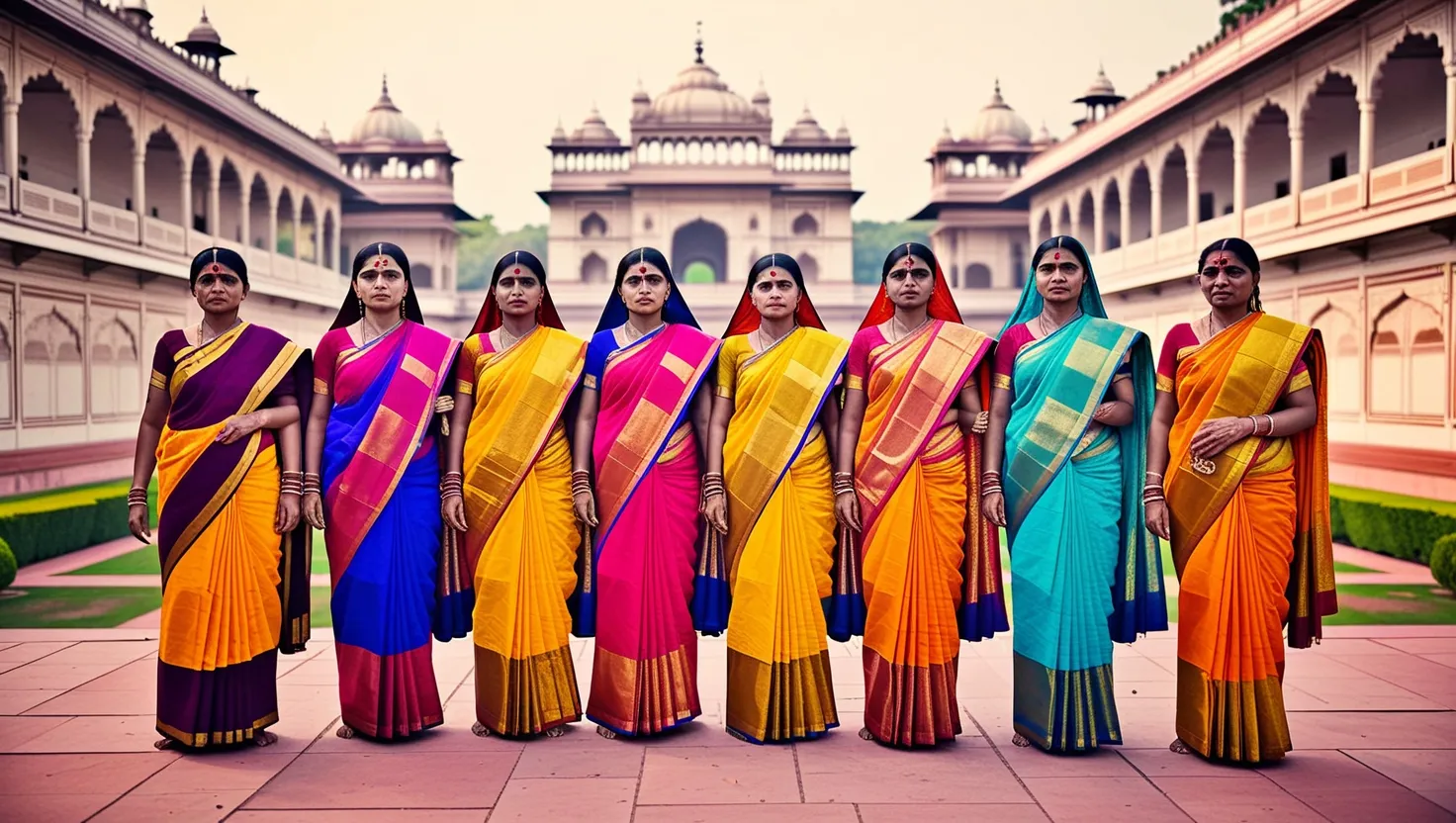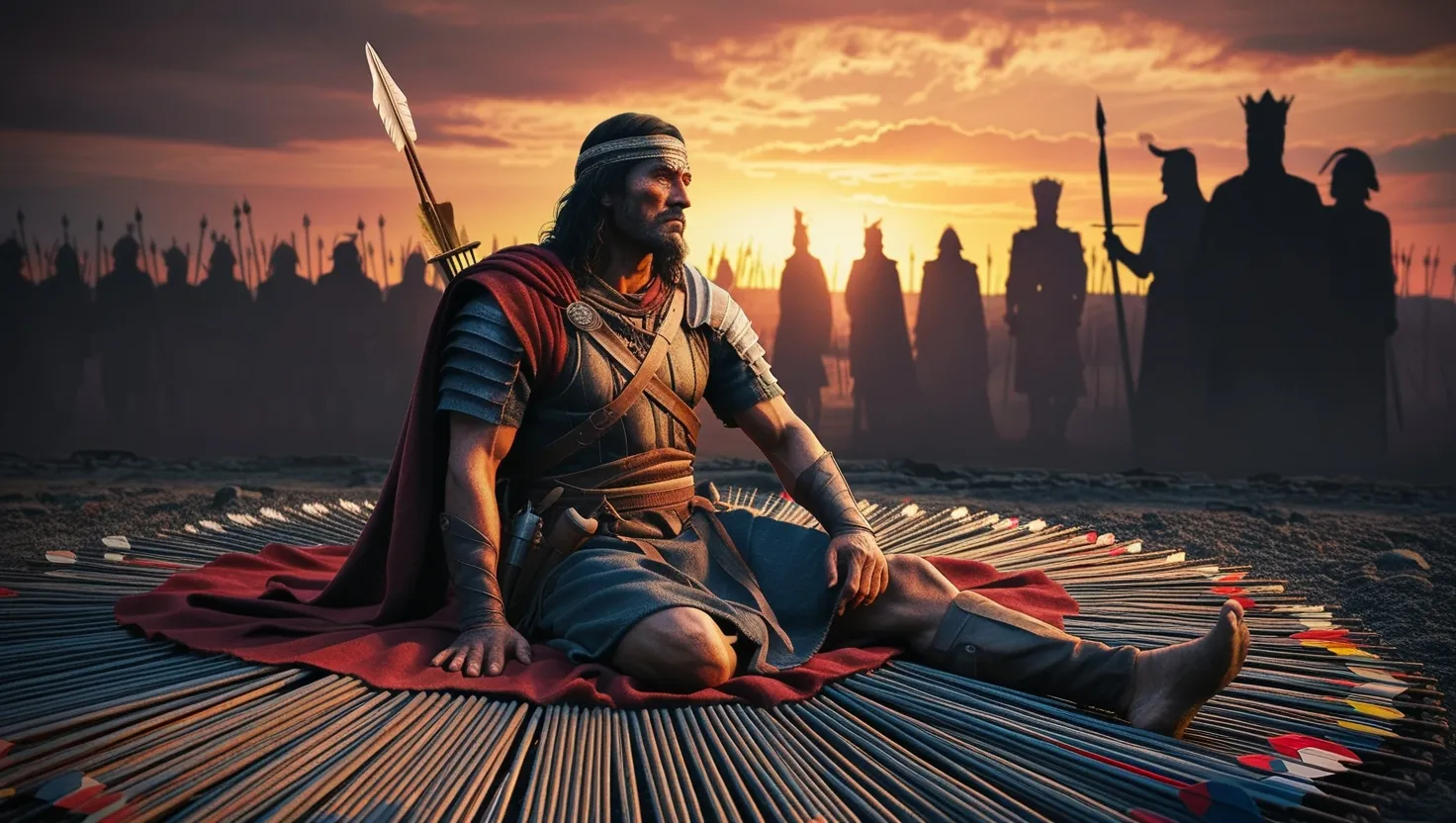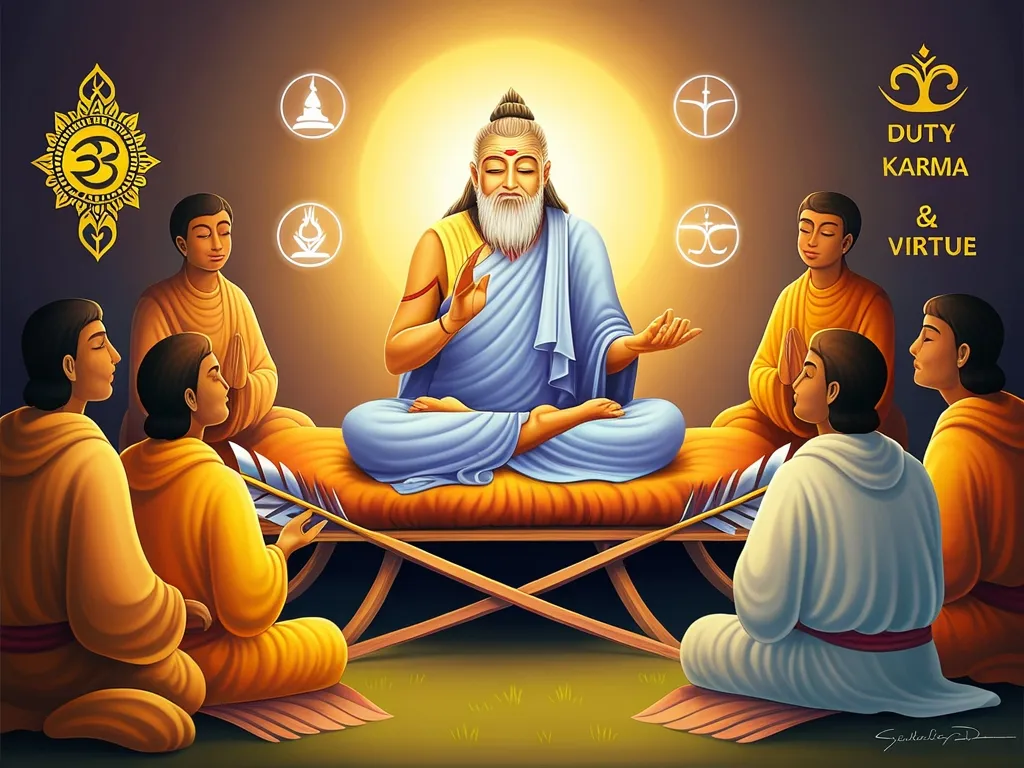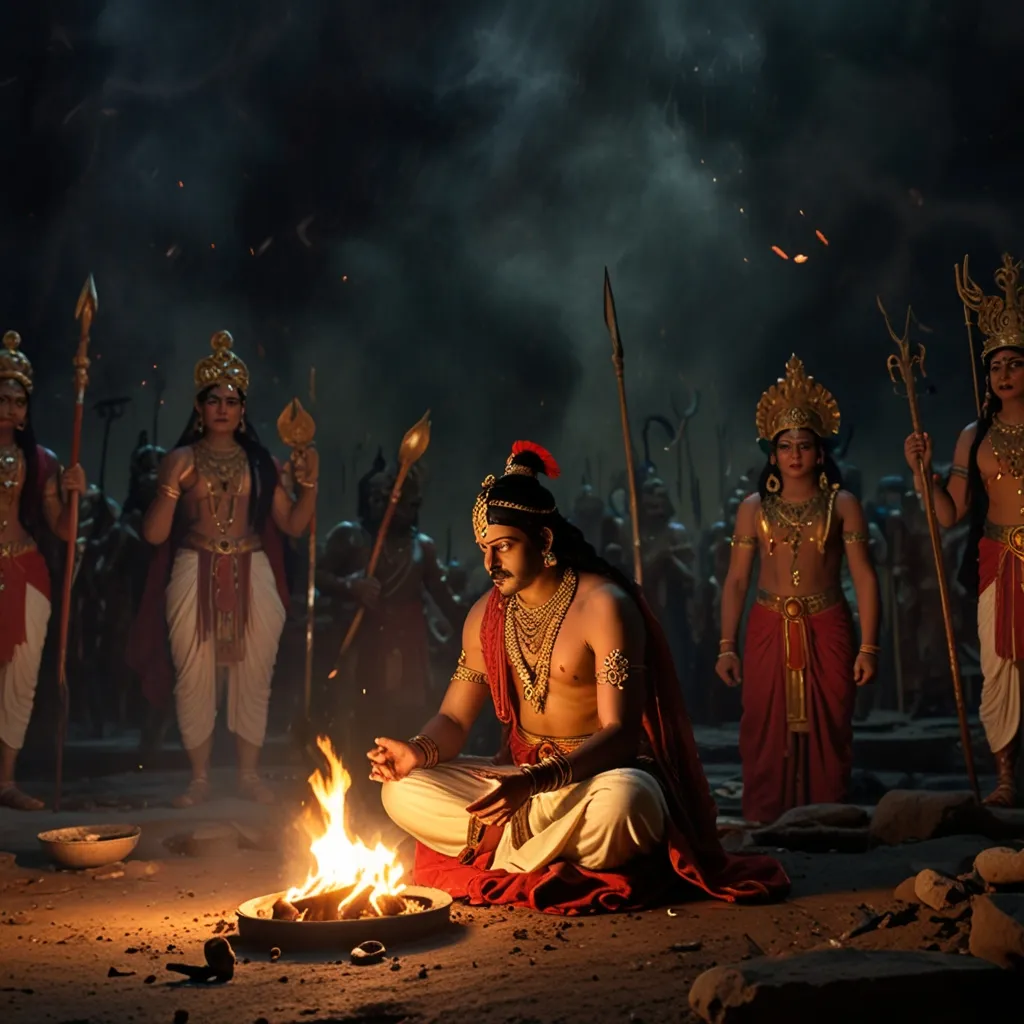Back in the day, there was this king named Vena. Dude was notorious for his arrogance and had zero respect for both the gods and his people. Married to Sunitha, daughter of Mrithyu (aka the god of Death), Vena didn’t think twice about brushing off advice from wise sages like Mareecha. He went about his reign completely disregarding dharma and even Vedic rituals. Oh, and he was super proud, claiming he could flood or burn the Earth if he wanted to.
Vena’s rule was rough for his subjects. He stopped all sacrifices on Earth and demanded the priests halt prayers and oblations to Lord Vishnu because he thought he was above everyone, even the gods. Not liking his vibe, Bhoomi Devi, the earth goddess, decided to bounce and took the form of a cow to hide away. The priests did all they could to change Vena’s mind but it was no use. So, they brought out the big guns – using their ascetic powers to turn blades of grass into weapons, they ended Vena’s life. Problem was, Vena had no sons, and a kingdom needs a king, right?
So, the sages got crafty again, using their ascetic mojo to massage Vena’s thighs from which a dark, stout man called Nishada popped out. He got sent off to the forest, and his descendants are said to come from the Vindhya region. Then, they rubbed Vena’s arms and voila – out came Prithu, with divine bows and arrows falling from the heavens to welcome him. Everyone was pretty stoked because not only did they have a new king, but it also meant Vena wouldn’t rot in hell since he now had a successor.
When Prithu took the throne, all was good, except Bhoomi Devi was still MIA and the land was barren. People started getting desperate, so Prithu took action. He chased after the goddess-cow with his bow, and after a long pursuit, she surrendered. To ensure the Earth would be fertile again, Prithu supposedly flattened mountains and began establishing agriculture and trade. He wanted his folks to live peaceful, prosperous lives but back then, the land was a tough cookie – dry, rugged, and covered in dense forests.
Prithu’s frustration led him to aim his fearsome bow at the Earth. The sea would stop moving, and mountains would crumble in his powerful presence. Terrified, the Earth cow begged for mercy, explaining that if he destroyed her, people would suffer even more. Prithu replied sternly that since the Earth had sinned by denying food, killing her was justified. Fearing his wrath, the Earth made a deal – if Prithu found her a calf, she’d give a bountiful harvest. Prithu agreed, used his bow to even out the land and thus, agriculture was born.
Before Prithu’s time, folks lived on fruits, roots, and meat. Farming wasn’t a thing. But thanks to Prithu’s efforts, everyone became farmers. Prithu chose Swayambhuva Manu as the calf and got corn as milk from the Earth. Not just him, but different sages, gods, and other beings each got unique gifts from milking the Earth-cow. This setup gave birth to various practices and professions which helped societies flourish. Villages and towns popped up, people settled, and agriculture and animal husbandry became the new norm. Since the king was the protector, he got supreme respect and taxes came his way.
Under Prithu’s leadership, civilization flourished. Agriculture, trade, and commerce became regular activities and he even oversaw Yajna rituals. However, some offerings got mixed up, giving rise to two mixed-caste tribes, the Suta and Magadha. These tribes engaged in horse and elephant training, chariot driving, and more, broadening society’s skill set.
Prithu’s name became synonymous with Earth. The world, made by Brahma, saw a shift in how things were done. Food production, dairy farming, and animal husbandry began under his rule. Different beings emulated Prithu, using distinct calves and vessels to milk the Earth’s gifts demonstrating the rich diversity of resources Earth offered.
While texts like the Matsya Purana give specifics, the Manu Smriti offers a twist, suggesting Prithvi was Prithu’s wife, not his daughter. The Vayu Purana narrates that Prithu, armed with a bow and arrows at birth, was ready to destroy the Earth, which then fled in cow form and submitted to his demands, making him the sovereign ruler, or chakravartin. This title made him the first king.
In Mahabharata, Vishnu himself crowned Prithu, bestowing upon him divine greatness so supreme his subjects would revere him as they did Vishnu. During Prithu’s rule, Dharma, Shri (goddess of wealth), and Artha (material prosperity) all anchored themselves within him, setting the foundation for his people’s success.
The Atharvaveda credits Prithu for inventing plowing and agriculture. Flattening rocky surfaces encouraged agriculture, cattle-breeding, commerce, and city development. The Rigveda even describes Prithu as a rishi, linking him to gods like Dionysus and Soma.
Scholars indicate there’s a broader narrative here. Prithu’s transformation from a hunter into a farmer symbolizes a significant shift – from meat consumption to dairy and agriculture. Earth is again at a crossroads today, facing destruction from animal agriculture, particularly beef production. This industry is a major culprit behind greenhouse gas emissions.
Chinese scholar Hiuen Tsang recorded the existence of Pehowa, named after Prithu, deeming him the first to earn the title Raja (king). The Bhagavata and Vishnu Puranas recount Prithu’s story with King Vena’s tyranny, his eventual fall, and the rise of Prithu. Prithu differed from Vena with his benevolence, re-establishing civilization and ensuring the Earth’s bounty through agriculture.
Prithu’s reign marked a new era where cultivation, pastures, and highways for merchants emerged, bringing prosperity. His agreement with the Earth set the precedent for agricultural practices that formed the backbone of society. By sparing her life and promising protection, Prithu earned the Earth’s loyalty, solidifying his legacy as a ruler who transformed life on Earth.
Prithu’s tale emphasizes a deep respect for the Earth and the essential shift from exploitative practices to sustainable living. As modern challenges loom large, the story of Prithu serves as a reminder of the balance required to maintain our planet’s health and prosperity.
